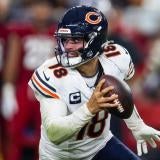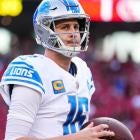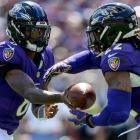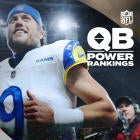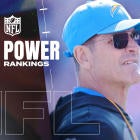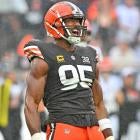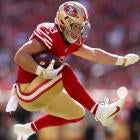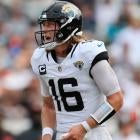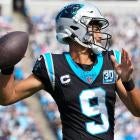Fans anticipated a highly-entertaining first round heading into the opening night of the 2020 NFL Draft. Those fans were not disappointed, as several teams made daring moves in order to help improve their rosters heading into the upcoming season. As expected, there were several teams that had highly successful nights, while a few teams did not do themselves any favors by making questionable picks on Thursday.
With Day 1 of the 2020 NFL Draft in the books, let's take a look at the big winners and losers from Thursday night.
Winner: Dolphins
With speculation Miami had been eyeing Tua Tagovailoa for an entire year, not having to trade up to get their new franchise quarterback served as the first surprise of the night. While his health will certainly be an ongoing concern (until it isn't), Tagovailoa is the type of difference-maker you need to have at quarterback to compete for titles.
At No. 18, the Dolphins were able to secure Austin Jackson, a promising tackle who Miami clearly believes will realize his potential sooner rather than later. Just as important as landing a franchise quarterback is protecting the new face of the franchise, so Miami had to leave Round 1 with a plan to shore up their protection up front.
After trading back to No. 30 (and picking up the Packers' fourth-round pick), Miami bolstered their secondary by taking Noah Igbinoghene, who was in the mix to be the third-best cornerback in the draft. With newly-signed Byron Jones, Xavien Howard and Igbinoghene, Miami now boasts one of the most talented cornerback trios in the NFL, which bodes well for a team that likes to play man coverage. The pick may have looked questionable on paper considering the investment in Jones, but Dolphins coach Brian Flores sure found out in New England how successful a team can be with an excellent cornerback depth chart.
The first round of the draft is in the books, so who were the winners and losers? Will Brinson and the Pick Six Podcast Superfriends are here to break it all down; listen below and be sure to subscribe for daily NFL goodness.
Loser: Packers
Jordan Love may end up being a quality NFL quarterback, but with Aaron Rodgers still just 36 and coming off an NFC title game appearance, the Packers would have been better served using this pick to pick to select either linebacker Patrick Queen or receiver Denzel Mims.
Instead, Green Bay takes a player that won't be in their immediate plans, assuming Rodgers stays healthy in 2020. And they paid an extra fourth-round pick to move up for the privilege to move up. While fourth-round picks rarely make an immediate impact, that's another potential player who could have helped the Packers in 2020 that won't get the chance.
Winner: Cowboys
While they had other needs, particularly at cornerback and on the defensive line, the Cowboys weren't going to pass on the chance at taking receiver CeeDee Lamb with the 17th overall pick. In Lamb, the Cowboys are getting a prolific college receiver who can replace Randall Cobb in the slot and give the offense one of the best wide receiver trios in the league.
Dallas' offense, already loaded with Ezekiel Elliott, Dak Prescott, and Amari Cooper, should be one of the league's most explosive units in 2020. Maybe it won't matter how the defense plays if the Cowboys can score at will. Dallas now has to go find solid players to strengthen their defensive unit on Friday and Saturday.
Loser: Saints
Cesar Ruiz is certainly a good prospect, but the Saints desperately need a playmaker at inside linebacker, and LSU's Patrick Queen was available when New Orleans was on the board with the 24th pick. If Ruiz turns into a lineup mainstay for the team over the next decade, it won't matter, but he wasn't the most logical fit for a team looking to win a Super Bowl title this year.
The Saints will now have to wait until the 88th pick to find a linebacker if they don't engineer a trade up -- and it's important to note that they started draft weekend tied for the fewest number of draft picks in their possession. Oregon's Troy Dye, Mississippi State's Willie Gay Jr., and Ohio State's Malik Harrison may be available at that point in the draft, but Sean Payton will have to keep his fingers crossed for a long part of Friday in hopes of landing one.
Winner: 49ers
The defending NFC champions pulled off an impressive first round, selecting defensive lineman Javon Kinlaw -- the second-ranked defensive line prospect in the draft -- after trading back one spot and picking up a fourth-round pick. Getting a fourth-rounder for free and selecting the player you would have taken anyway is always a fine move, and Kinlaw gives the team a quality player to step into the DeForest Buckner-sized hole in the middle of their defense.
The 49ers then used that pick as part of a trade with the Vikings, moving up six spots to select receiver Brandon Aiyuk. While the team had indicated they could trade down from both their first-round picks, the 49ers probably didn't believe the Arizona State receiver would still be on the board late in the first round, considering he had been linked to the Eagles at No. 21. For a team in win-now mode, landing difference-makers on both sides of the ball has to be seen as a success for a day's work.
Loser: Giants
Andrew Thomas is one of the top-rated offensive tackles in this class, and the Giants did need an upgrade at that position heading into the draft. So the pick makes sense, right?
Not so fast. By taking Thomas, New York passed on the chance at selecting Isaiah Simmons, the fastest linebacker in the draft and a player that would have fit perfectly into new defensive coordinator Patrick Graham's scheme. It will be interesting to see if Simmons blossoms in Arizona, the team that ultimately selected him with the eighth pick.
Winner: Raiders
The Raiders stayed true to their brand by selecting receiver Henry Ruggs III, the fastest player in the NFL Draft. The addition of Ruggs should significantly improve a Raiders offense that already includes Josh Jacobs, Tyrell Williams, Hunter Renfrow, Trent Brown, Rodney Hudson, Darren Waller, and Derek Carr.
Las Vegas then acquired Damon Arnette, a talented cornerback whose draft stock continued to climb in the days leading up to the draft. Arnette, despite playing with a broken wrist last season, earned All-Big-10 honors during his senior season. He also did not allow more than one touchdown in each of his four seasons with the Buckeyes, according to the Raiders' team website. While many saw the selection as a reach at No. 19, the reality is that he would have been long gone by the team's next selection in the third round, so if they couldn't find a worthwhile trade to move down, the play is to take the guy you like rather than listen to the masses.
Loser: Seahawks
Linebacker wasn't considered a major need for the Seahawks heading into draft weekend, but even if they really wanted to add to the position, the one they chose with the 27th pick -- Texas Tech's Jordyn Brooks -- is a head-scratcher. Instead of taking LSU's Patrick Queen (the highest-ranked inside linebacker in the draft), the Seahawks instead went with Brooks, the 11th best linebacker and the 139th-best prospect in CBS Sports' pre-draft rankings, though to be fair buzz had built for Brooks as a possible Round 1 pick over the last week.
While he was a solid tackler during his time at Texas Tech, Brooks leaves something to be desire as it relates to pass defense. His size (6-foot-4, 240 pounds) and speed (his recorded time in the 40-yard-dash is 4.54 seconds) would suggest that he fits best as a weak side linebacker, a position that is currently occupied by K.J. Wright. That being said, Wright, 31, is entering the final year of his contract, which helps somewhat justify the Seahawks' decision to take Brooks with this pick.
Winner: Vikings
While many people expected the Vikings to take a receiver and a cornerback with their two first-round picks, not many people predicted how Minnesota would be able to fill these spots on Thursday night. With the 22nd pick, the Vikings fell into selecting former LSU receiver Justin Jefferson, an extremely prolific college receiver who caught 111 passes for 1,540 yards and 18 touchdowns during his final season in Baton Rouge. The acquisition of Jefferson should help replace the loss of Stefon Diggs, who was traded to Buffalo earlier this offseason, and it comes after many people projected the talented receiver to be gone in the teens, and certainly after the Eagles had made their pick at No. 21.
Minnesota was then able trade their 25th pick to the 49ers in exchange for the 31st, 117th and 176th picks. With the 31st pick, the Vikings were able to select TCU's Jeff Gladney, the sixth-best cornerback in CBS Sports' prospect rankings. A first-team All-Big 12 selection last season, Gladney paced the conference with 14 pass breakups in 2019. He would have been a fine fit for the Vikings at No. 25, so to get him plus two extra picks is a coup. Minnesota will likely use at least one of the extra picks they acquired on Thursday night to further address their secondary, a unit that lost Xavier Rhodes, Trae Waynes and Mackensie Alexander during free agency.



